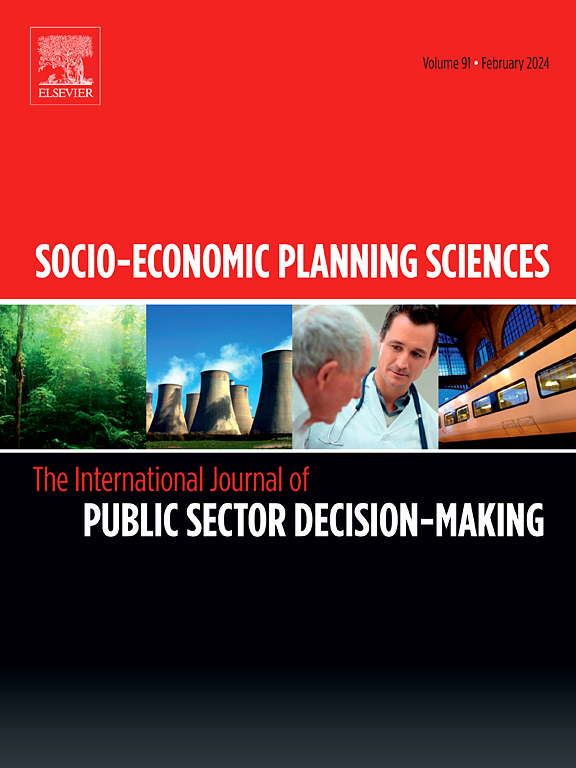基于混合比较多属性决策模型的绿色交易合规绩效评价
IF 5.4
2区 经济学
Q1 ECONOMICS
引用次数: 0
摘要
由《欧洲绿色协议》发起的环境和经济转型不仅影响着欧盟成员国,也影响着与欧盟有贸易往来的其他国家。这一转变要求农业、工业、交通、能源和金融等部门向可持续实践转变。遵守《绿色协议》对各国来说越来越重要,尤其是那些与欧盟有重要商业关系的国家。然而,不同的发展水平导致不同程度的实施。虽然存在关于欧盟成员国绿色协议合规的研究,但对具有大量贸易关系的欧盟候选成员国本文章由计算机程序翻译,如有差异,请以英文原文为准。

Evaluation of Green Deal compliance performance with a hybrid comparative multi-attribute decision model
The environmental and economic transformation initiated by the European Green Deal is influencing not only EU member states, but also other countries engaged in trade with the EU. This transformation mandates a shift towards sustainable practices in sectors such as agriculture, industry, transportation, energy, and finance. Compliance with the Green Deal is increasingly crucial for countries, particularly those with significant commercial ties to the EU. However, differing levels of development lead to varying degrees of implementation. While studies on the Green Deal compliance of EU member states exist, an evaluation of Türkiye—a candidate EU member with substantial trade relations—would address a significant gap in the literature. This study introduces a novel hybrid comparative multi-attribute decision model that combines subjective (Best Worst Method and its derivatives) and objective (Entropy) weighting to determine the relative importance of 14 sub-criteria under three main criteria: “Reducing” the impacts of climate change, “Protecting” the planet and health, and “Enabling” a green and just transition. Using the Ratio Product Model (RPM), Türkiye's Green Deal compliance from 2017 to 2021 was evaluated. Sensitivity analysis was conducted to validate the robustness of the findings, and comparisons were made using various multi-attribute decision models, including SAW, TOPSIS, and VIKOR, as well as benchmarking against EU countries. The criteria weights, derived from a combination of subjective and objective methods, highlighted the dominant importance of the “Reducing” criterion across all methods. The “Enabling” and “Protecting” criteria showed slight variations in importance depending on the method. The RPM results indicated that 2021 was Türkiye's best-performing year in terms of Green Deal compliance, while 2017 showed the weakest performance. Despite some fluctuations between 2018 and 2019, Türkiye demonstrated significant progress overall. The study not only advances the methodology for evaluating Green Deal compliance but also provides actionable insights for policymakers and industry stakeholders, enabling more informed decision-making. By highlighting Türkiye's trajectory, the findings offer strategic guidance for non-EU countries aiming to align with Green Deal objectives, fostering sustainable development and strengthening economic ties with the EU.
求助全文
通过发布文献求助,成功后即可免费获取论文全文。
去求助
来源期刊

Socio-economic Planning Sciences
OPERATIONS RESEARCH & MANAGEMENT SCIENCE-
CiteScore
9.40
自引率
13.10%
发文量
294
审稿时长
58 days
期刊介绍:
Studies directed toward the more effective utilization of existing resources, e.g. mathematical programming models of health care delivery systems with relevance to more effective program design; systems analysis of fire outbreaks and its relevance to the location of fire stations; statistical analysis of the efficiency of a developing country economy or industry.
Studies relating to the interaction of various segments of society and technology, e.g. the effects of government health policies on the utilization and design of hospital facilities; the relationship between housing density and the demands on public transportation or other service facilities: patterns and implications of urban development and air or water pollution.
Studies devoted to the anticipations of and response to future needs for social, health and other human services, e.g. the relationship between industrial growth and the development of educational resources in affected areas; investigation of future demands for material and child health resources in a developing country; design of effective recycling in an urban setting.
 求助内容:
求助内容: 应助结果提醒方式:
应助结果提醒方式:


